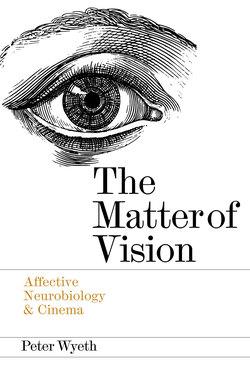Читать книгу The Matter of Vision - Peter Wyeth - Страница 20
На сайте Литреса книга снята с продажи.
The Anti-Science tradition
ОглавлениеA further characteristic of the thinkers behind Film Theory was what seemed rather like a distaste for and disinterest in science. Christian Metz put it that ‘Science is a big word’.44 The contention here is that Language, in contrast, is a small word. It seems quite extraordinary that a whole intellectual tradition could ignore the advances in science, and particularly in neuroscience, as though they did not exist. It is as though Kant gave a license to philosophy, in his declaration of its independence, to turn decisively away from science in the firm belief that the autonomy of philosophical truth was a sufficient protection. While a certain autonomy is reasonable, as the discourse of philosophy and that of science are not coterminous, the result in many cases has been that tumbling ground for whimsies William James described, the ‘Fantastical learning’ decried by Bacon. The failure to engage with science would seem to be a significant intellectual failure, virtually a dereliction of duty, and hardly credible seen from the outside. The contrary fact is that most scientists appear to regard ‘post-modern’ varieties of philosophy at best as utterly ineffectual, at worst as a downright fake, as in Richard Dawkins view of Lacan,45 the psycho-analyst.
As one educated in the Humanities and working in the Arts, broadly defined, I shared that guilt. It was only in realising how helpless Film Theory was at providing a fundamental account of Vision that I turned to science. Over the course of this project I have developed enormous respect for the scientists whose patient and rigorous work suggested certain parallels with my own instincts about Cinema, and that amplified my reservations about Film Theory to the point where it appears to me to be essentially idealist rhetoric, serving no purpose external to itself, academic in the worst sense of the term, and quite unwilling and unable to answer questions of any wider relevance than its internal concerns. As I recall Colin McCabe once asked ‘A theory of what, exactly?’.46
Viewed from my perspective on science, it seems a terrible waste of intellectual effort to see so much scholarship spent in the fruitless pursuit of the Castles in the Air that Film Theory has left as its inheritance. If that effort had instead been turned towards the formulation of ideas capable of being tested and with the goal, for example, of contributing to knowledge about how the brain works, using Cinema as a concrete cultural instance, a remarkable archive with which to further our understanding of the relationship between Vision, the brain and Cinema, that would seem to be far more worthwhile, a substantial contrast to the culture and achievements of what has gone before.
The advances in the areas into which I have delved, namely neuroscience and evolutionary biology, seem to hold out not just a real understanding of Vision and with it Cinema, and the potential for making a constructive contribution to greater understanding of how the brain works, but also the possibility of a proper basis for a Science of Culture, that would finally bring back together Art & Science through a depth of analysis quite simply unthinkable with Language-based analysis.
